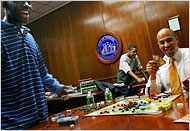 with the author’s permission, i share these reflections from an oregon state university professor who taught at the oregon state penitentiary in 1966-1967
with the author’s permission, i share these reflections from an oregon state university professor who taught at the oregon state penitentiary in 1966-1967
(from a personal email):
Bits and pieces flutter by when I think about my Tuesday nights teaching there in 1966-67 with a few colleagues from OSU. The only ones whose name I recall are Will Gamble and Harry Goheen, a math prof. As I recall it was Harry’s idea and the first program of its kind at OSP.
Memories of prison sights and sounds come back first; specifically, the sound of that electrically powered steel door that slammed closed behind us as we walked the shiny hallways to our classrooms. I never got used to it.
And I remember the absence of sights and sounds I had expected that first night. You know, tattooed arms thrust between bars, young and old men yelling, cursing, threatening. For the record, I recall seeing none of that movie-set stuff in my one-year, once-a-week, 3-hour visits to OSP.
And I will not ever forget the inmates’ unrelenting appreciation for our being there.
That first night I was led to a classroom with perhaps a dozen young men who had signed up for Interpersonal Communication (i.e., Speech 111). The following week one of them handed me a transcript of my lecture, taped on a prison recorder, typed on a prison typewriter. It was all any of them had to give. I was touched by that as well as their respect and their undivided attention throughout the year.
And I recall the corrections officer who did a slow burn telling one of my colleagues of the unfairness of our fawning over guys in prison who were getting college credits for free, when his kids “can’t afford to go to college.”
And then the prison riot of 1967 or 1968. (I was doing a post-doc fellowship at Ohio State that year and missed the action when inmates took over a portion of the prison,.)
I remember reading the wire stories in Columbus about the turmoil, and later learned that a few inmates formed a protective circle around the sole female OSU professor who was trapped in a classroom with her students. It might have been the first time some of them had done something so selfless and …well, so noble. (She was untouched and ultimately escorted out to safety).
A half a dozen of my students were released on parole over the following months. Some of them enrolled at OSU as undergrads. One was Bruce, a bright, young hold-up man, who was later elected ASOSU president and last I knew, was making plans to marry an OSU coed (to the utter horror of her Beaverton mother). I never did find out if the marriage came about.
Then there was Gordon, a George Raft look-alike, talk-alike, act-alike. He also was up for robbery. He got out, went to OSU, then left to take a job as a reporter for The Bend Bulletin. Once there, the editor of the paper, became a father-figure to him for a year or two. A jealous husband blew Gordon away with a shotgun for trying to romance the man’s wife.
Mick. My father, a Detroit insurance executive, developed a pen-pal relationship that started when Mick was in prison and lasted I don’t know how long, perhaps until my dad died in 1984. Dad had a reputation for helping young men build successful careers in business.
I hadn’t thought in a long while about this experience of 40 years ago, Michelle. I’m glad Bill’s e-mail re-opened that book. In retrospect I think our program made a small contribution to a few young men and gave to ourselves the satisfaction making it happen, however briefly.
I wish you well as you and your students well as you continue your program, knowing that the hunger to learn can survive, indeed thrive, even within the impersonal halls of a state penitentiary.
Best regards,
ROB PHILLIPS
OSU Emeritus Professor of Journalism
**the photo shows debris inside the Oregon State Penitentiary after the March 9, 1968, riot-fire (from the Oregon Historic Photograph Collections at the Salem Public Library)

 in an attempt at real public criminology,
in an attempt at real public criminology, 


